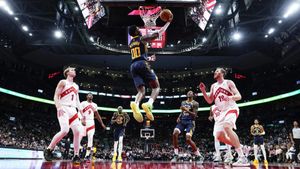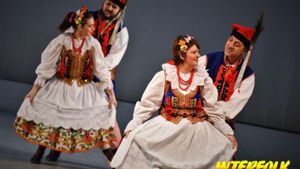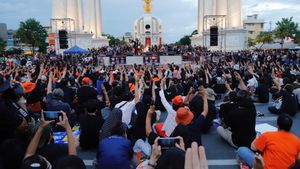World leaders are converging on Kyiv as Ukraine approaches the third anniversary of Russia's devastating full-scale invasion, emphasizing international support and solidarity for the embattled nation. Canadian Prime Minister Justin Trudeau is set to meet with Ukrainian President Volodymyr Zelenskyy, who revealed this pivotal visit in a news conference held on February 23, urging Canada and allies to rally around Ukraine's cause amid potential shifts in global negotiations.
Zelenskyy welcomed Trudeau's presence, stating, "Canadian Prime Minister Justin Trudeau will be here with a visit tomorrow," pointing to the high-level discussions focused on peace and security for Ukraine, as he marked the significant day with expressions of hope and urgency. This summit will host numerous leaders, including European Commission President Ursula von der Leyen and representatives from Nordic and Baltic nations, strategizing on security guarantees and military support.
“This is an important opportunity to discuss Ukraine’s strategy and the framework for security guarantees,” Zelenskyy remarked, signaling the need for stronger allied unity as tensions simmer amid negotiations with Russia.
Meanwhile, the backdrop to these discussions stirs concern among European leaders about U.S. diplomatic maneuvers aimed at establishing peace with Russia. Former U.S. President Donald Trump has suggested shifting the onus onto Europe for leading support efforts for Ukraine's financial and defense needs, complicity feared by many as they navigate relations with both Kyiv and Moscow.
U.S.-Russia talks, which have reportedly proceeded without significant Ukrainian involvement, have ignited skepticism and caution among Ukraine supporters. Oleh Nikolenko, Ukraine’s consul general in Toronto, echoed this sentiment, describing the rhetoric emanated from the U.S. as “counterproductive” and warned it could embolden Russian aggression. “We think at this time, it’s really high time for Canada to play a leadership role,” Nikolenko insisted, emphasizing the need for Canada's military aid, humanitarian support, and training for Ukrainian forces.
Thousands took to the streets of major European cities such as Prague, Paris, and Brussels on February 23-24 to mark the anniversary with rallies and demonstrations supporting Ukraine. Czech President Petr Pavel addressed the crowd, saying, "From what happened, I think it is quite clear who is the aggressor, who violated international law, and who is the victim, whose side we should stand on." His comments reflect the broader European sentiment and commitment to ensuring justice and accountability for the war launched by Russia.
The Prague rally's support was echoed across major cities, with participants demonstrating not only solidarity but also growing demands for unwavering support for Ukraine's sovereignty. Thousands unfurled large banners, including a monumental 262-meter flag stretching through Paris, symbolizing collective resistance against aggression. Amidst the anxiety over Kyiv's position as negotiations intensify, European leaders are vacillated about whether Kyiv should be included, fearing their exclusion from pivotal discussions dictated by U.S. policymakers.
Zelenskyy's readiness to make personal sacrifices for peace was palpable during the news conference. "If to achieve peace, you really need me to give up my post, I’m ready," he stated, showcasing both his commitment and desperation as the conflict drags on, heightening the urgency for global support. His statements serve as both a plea and a call to action, pushing allies to engage more decisively.
Support for Ukraine also resonates deeply within Canada, where Ukrainian Canadians rallied against Russian aggression led by former Finance Minister Chrystia Freeland. Speaking to throngs of supporters, Freeland emphasized, “We are on the side of democracy versus dictatorship.” With her own family roots tracing back to Ukraine, her emotional appeal struck chords amid rising fears concerning geopolitical stability.
On the diplomatic front, Canada's Foreign Minister Mélanie Joly reiterated the country's interest in security guarantees surrounding any post-war resolution discussions. Her calls signal Canada’s potential to play a pivotal role not only as a financial supporter but as a regional stabilizer amid changing global dynamics.
Trudeau has remained a strong advocate for Ukraine throughout his time as Prime Minister, participating actively with European allies to counterbalance U.S. drift toward making concessions with Moscow. He is slated to step down as leader following the Liberal Party's leadership elections, marking the visit as particularly significant to his diplomatic legacy.
Despite the heartening global response, Ukrainian Canadians express exhaustion and frustration as the geopolitical tides shift. Nikolenko encapsulated this sentiment, stating, “They’re angry because they want this war to end in a just manner.” The stakes remain high as the third anniversary convoils international support and the ramifications of unresolved issues continue to hang heavily over the conflict.
Overall, as global leaders converge on Ukraine and citizens rally worldwide, the emphasis on unity, security, and decisive action has never been clearer or more urgent. The future of Ukraine may depend on whether these discussions and demonstrations translate to tangible results on the ground, marking this anniversary as not just a reflection of the past but as beckoning for vibrant commitment to shaping the future.



